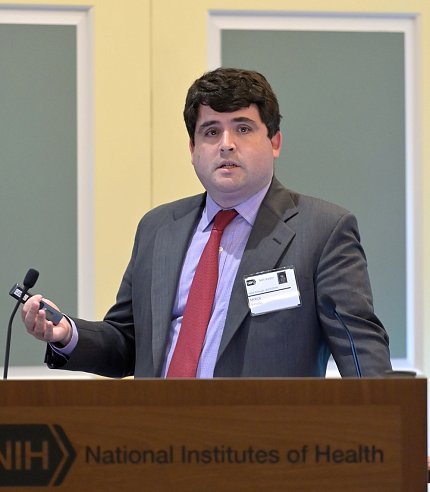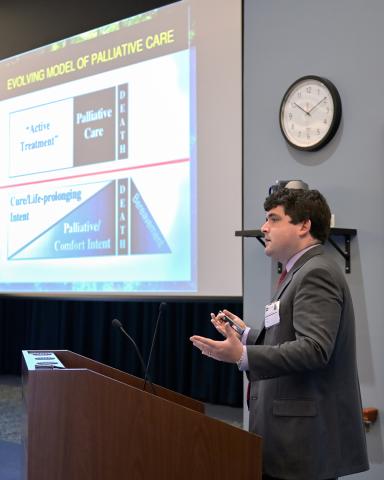Operation Relief
Shinall Advocates for Earlier Palliative Care

Photo: Marleen Van Den Neste
No matter how gracefully we age, most people will eventually develop a chronic or degenerative condition toward the end of life. When that time comes, the considerations can be overwhelming—from managing symptoms to confronting weighty decisions. That’s when palliative care often lends a helping hand.
Palliative care is a process designed to improve the quality of life of patients suffering from serious or life-threatening illnesses. The process, which encompasses treating pain and other symptoms while alleviating emotional and spiritual suffering, typically occurs at the advanced or end stages of illness, when curative or life-prolonging options have run out.
Dr. Myrick Shinall, a general surgeon and palliative care specialist at Vanderbilt University Medical Center, has long been frustrated by this late-stage palliative care model. His research aims to show the benefits of starting such care much sooner.
In an ideal model, “Palliative care would be a focus even from the very beginning of dealing with a serious illness,” Shinall said. “And as people progress through the process of what will eventually be a terminal illness, this palliative care part of it becomes a bigger and bigger part of their overall medical care.”
Shinall, who spoke in Wilson Hall at an Aug. 27 NIH Rising Stars lecture, part of a series featuring the work of exceptional early-career investigators, comes to this topic from a unique perspective. It’s unusual for a surgeon to have a palliative care background. Shinall has both a medical degree and a doctorate in religion, which attracted him to the spiritual side of patient care, inspiring him to specialize in palliative medicine.
“As surgeons, we tend to think of surgery and its recovery as a discrete period,” he said. But his palliative care training led him to see his relationship with patients as more of a deeper commitment, beyond the operation and initial post-op recovery. “I was not used to thinking about trajectories as long-term patterns of the way that illnesses affect people.”

Photo: Marleen Van Den Neste
The trajectory of dying most studied in palliative care research is terminal illness, particularly cancer. Cancer patients tend to feel well, other than treatment side effects, until the last few months or weeks of life when they start rapidly deteriorating. By contrast, patients with organ failure experience a vicious cycle of exacerbations as they decline over time. A third main trajectory is frailty, such as dementia patients who slowly, steadily decline.
“Aside from sudden death,” said Shinall, “these trajectories of dying are really trajectories of unhealthy aging.”
The rate of decline differs based on the disease. In his palliative role, Shinall helps patients assess their place on the illness trajectory and their available options.
Research over the past decade has supported his theory of increased benefits from starting palliative care earlier in the disease process. Several oncology clinical trials that incorporated palliative care intervention from the time patients were first diagnosed showed improved quality of life. And there was another fortuitous finding.
“One of the fascinating and tantalizing findings was the secondary outcome of survival,” said Shinall. Data started emerging that showed “palliative care might not only improve your quality of life, but it might also improve length of survival for some patients.”
Increased survival rates grab attention in the medical community.
“When I can show other surgeons these papers that show survival ranges for palliative care,” said Shinall, “palliative care suddenly seemed more interesting to them.”
The most consistent evidence showing the impact of palliative care comes from patient-reported outcomes such as symptom relief and improved mood, which are vital to patients. But surgeons usually get more excited by the hard outcomes, the ultimate being survival, which may help convince them of the importance of palliative care.
Shinall hopes that results from a current study will provide further evidence supporting earlier palliative care intervention. He currently is heading an NIH-funded clinical trial at Vanderbilt called SCOPE (Surgery for Cancer with Option of a Palliative Care Expert).
All enrolled patients are undergoing surgery for major abdominal malignancies, the kinds of cancers with high rates of recurrence and mortality. Some of the patients consult with palliative care specialists pre- and post-op with ongoing consults for up to 3 years. The trial will assess quality of life during the months following surgery, post-traumatic stress symptoms, long-term care and survival, comparing the outcomes of patients who received specialized palliative care with a control group that did not receive such care.
Patients, their families and clinicians usually don’t consider palliative care until there’s a health crisis, said Shinall. Without that sense of urgency, it’s easy to overlook the need for such intervention. But Shinall asserts that wherever patients are on their trajectory, whether they’re having surgery, an organ transplant or other intensive medical treatment, palliative care can play a critical role.
“For me, in my studies, I want my audience to be surgeons,” said Shinall. “If my studies are positive, I want surgeons to read them and say, ‘Hey, this is something I should do for my patients.’”
